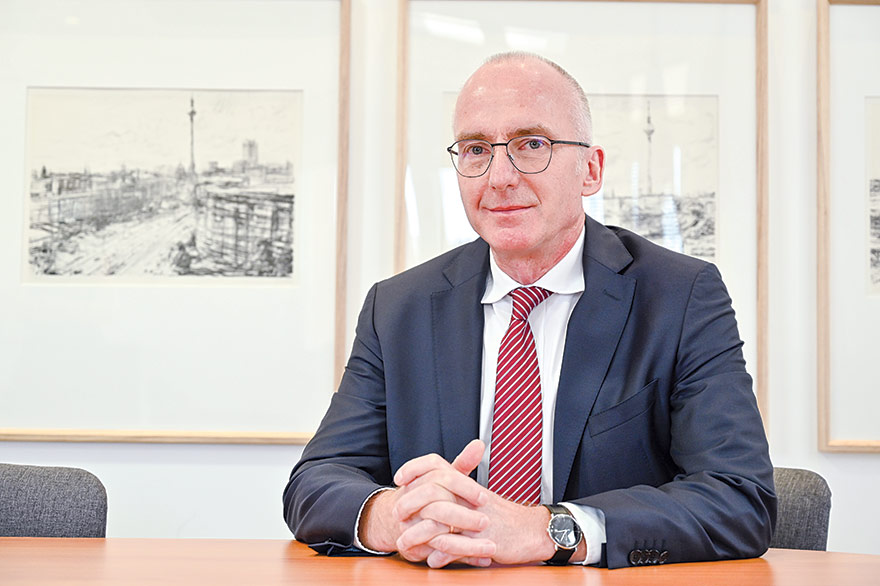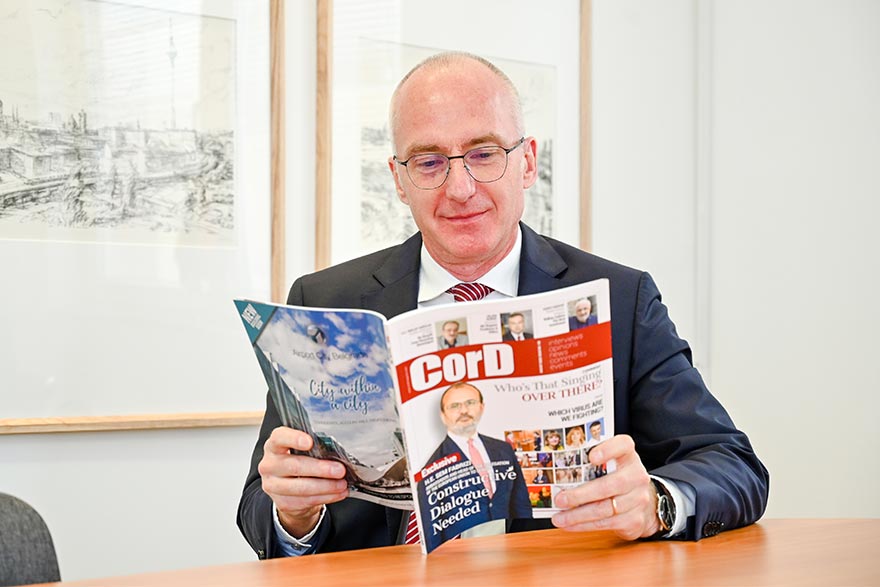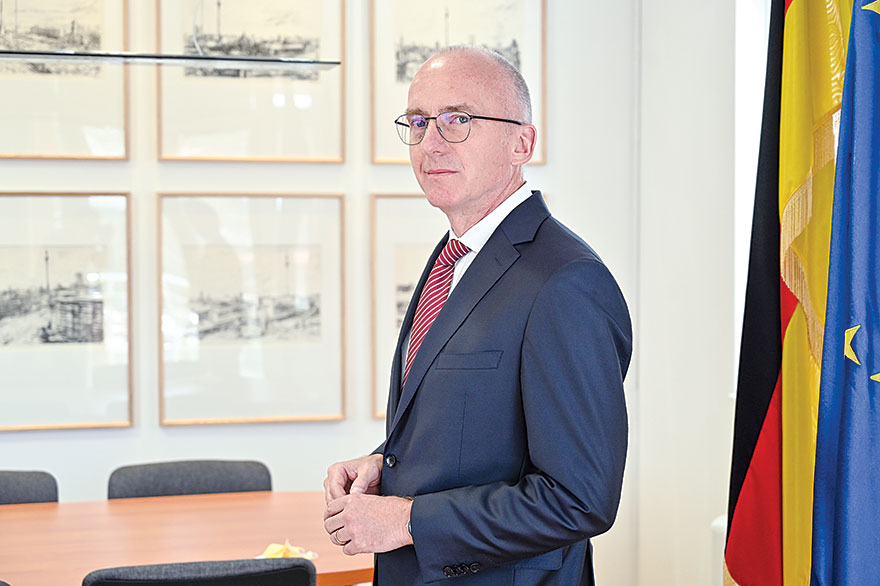There is a danger of an imbalance between the overall pace of negotiations and the pace of rule of law reforms. Therefore, the basic equation is quite simple: the more progress on rule of law, the more chapter openings are possible – Thomas Schieb
The annual report of the European Commission, which has been announced for publication in October, should evaluate how far Serbia has progressed in the implementing of reforms linked to EU membership. At that time there will be a discussion within the EU over whether some new chapters in the accession negotiation process could be opened,” says H.E. German Ambassador Thomas Schieb, speaking to CorD Magazine. Turning to the recent renewal of dialogue on the normalisation of relations between Belgrade and Priština, ambassador Schieb says that the essence is to ensure that “both sides reach a legally binding agreement that enables both Serbia and Kosovo to pursue their EU accession aspirations and fulfil their rights and obligations as EU members”.
Asked whether that process also implies that Serbia must recognise Kosovo’s independence, Schieb says: “In my political imagination … it would be hard to envisage such a solution without Serbia recognising Kosovo”.
Your Excellency, Germany took on the presidency of the European Union during the very difficult period of the COVID- 19 Pandemic. In your opinion, what will be the biggest challenges for Berlin until the end of 2020?
– The Council Presidency of the European Union is always a very challenging responsibility. And it goes without saying that this is especially true now, given the COVID-19 Pandemic – a health crisis on a global scale with enormous economic and political repercussions. The logistical difficulties of a situation when physical meetings and travel have become part of the problem alone make it challenging to organise a presidency. The German EU Council Presidency does everything in its power to deal with this situation.
When addressing the economic and social consequences of COVID-19, it is important to do this in a smart, intelligent way. The objective is to ensure a transition towards a sustainable economy, also taking account of the EU Commission’s proposal for the so-called “Green Deal”.

At the very beginning of our presidency, we reached an agreement on the multi-annual financial framework for the next seven years. This agreement provides for a total volume of more than 1074 billion euros. An additional 750 billion euros will support the recovery of the European economy by the end of 2023.
Beyond COVID-19, there are other difficult issues on the agenda, foremost concluding negotiations with the UK on future trade relations in order to avoid a hard BREXIT. And, lasty, maintaining the momentum regarding the enlargement process.
You’ve stated that the Western Balkan region remains high on the agenda of Germany’s presidency of the EU. What specifically does that mean for the region?
– First of all, it means that, in our response to COVID-19, we include the Western Balkans. The virus knows no borders. We have to deal with it together. That’s why I’m very satisfied with the EU’s financial support of €3.3 billion that’s been mobilised for Serbia and the Western Balkans so far, and the fact that European response mechanisms are also eligible for the countries of this region. The Union Civil Protection Mechanism, for example, has been activated and assistance through the delivery of equipment allocated.
Beyond COVID-19, there are other difficult issues on the agenda, foremost concluding negotiations with the UK on future trade relations in order to avoid a hard BREXIT. And, last but not least, maintaining the momentum regarding the enlargement process
Besides COVID-19, we are glad about the new momentum of enlargement. This is most visible in the cases of North Macedonia and Albania. We are preparing accession talks with these two countries by finalising the negotiating frameworks within the Council right now. During our Presidency we aim to hold the first intergovernmental conference with North Macedonia and, if conditions are met, also with Albania. We want to promote the EU rapprochement of all the countries of the region and pay a lot of attention to the ongoing accession negotiations with both Serbia and Montenegro. Another focus is the issue of demographics and migration, which we will discuss at a conference on Youth and Migration with the Western Balkan countries in Berlin at the end of October.
The European Commission has announced a major economic investment plan for the Western Balkans, as a separate project. Will that plan be presented this autumn, as previously announced?
– That is a question for the Commission, of course, but I think I’m free to say that the Economic and Investment Plan will be presented this autumn. To the best of my knowledge, preparatory work is quite advanced. After the very substantive COVID related EU solidarity package, this will be a further means to support the countries of the region, to spur long-term recovery, boost economic growth focusing on sustainable recovery and the idea of a European Green Deal as well. The green transition and digital transformation will play a central role in modernising the economies of the Western Balkans. Investing in clean and digital technologies and capacities – in combination with a circular economy – will help to create jobs and growth.
International financial institutions have predicted economic recessions for most European countries this year, Germany included. How will this impact on economic cooperation between Germany and Serbia?
– The interim projection 2020, which was published by the German Federal Ministry of Economic Affairs at the beginning of September, shows that the recession was not as severe as feared and the upswing is going faster than expected. Also, expectations among German companies for the coming months seem to have brightened up again.
The Government of Serbia invested significant funds to help the economy. That was instrumental in tackling the crisis. Positive developments in Germany and Europe would also be good news for Serbia, given the close economic links. Germany is Serbia’s biggest trading partner; German companies’ investments in Serbia are significant: around 450 companies in Serbia have created about 64,000 jobs to date. Of course, some companies are able to cope with the current challenges better than others; some might have postponed the implementation of projects. However, we see no signs of German companies turning their back on Serbia, on the contrary.

Recently, Germany and Serbia established an Institutional Partnership which aims, among other things, at strengthening the respective supply chains, in accordance with Serbia’s industrial policy strategy and the EU Green Deal. Also, in the framework of the German Development Cooperation, we are setting up an emergency grant scheme for the private sector, in support of the digitalisation of small and medium-sized enterprises.
Serbia didn’t open a single new negotiating chapter with the EU during the course of the Croatian presidency. Do you think that any will be opened during the German presidency?
– We hope so. However, this depends first and foremost on Serbia. Serbia determines the speed at which the accession process advances. The more substantial the reforms Serbia is implementing, in particular regarding the rule of law, the higher the chance of opening new chapters.
In order to open a chapter, two conditions need to be fulfilled: it needs to be technically ready; and we need to see progress in the fulfilment of those conditions that are particularly important for EU accession, i.e. the rule of law, in particular justice reform, media freedom and the fight against corruption. We know from experience that such reforms take more time to be implemented and to show results than rather technical adjustments in, for example, the field of agriculture. There is a danger of imbalance between the overall pace of negotiations and the pace of rule of law reforms. Therefore, the basic equation is quite simple: the more progress on the rule of law, the more chapter openings are possible.
The lack of progress on implementing the action plans led to the EU’s decision not to open a new accession negotiation chapter this summer. Without swift and tangible progress with regard to the media situation, independence of the judiciary and the fight against corruption, I’m afraid it will be difficult to argue for further chapter openings
In October we expect the Commission’s country report, which will assess Serbia’s performance over the last 12 months. Then the discussion about possible chapter openings will start within the Council. Of course, other issues apart from the rule of law also factor in, like normalisation with Kosovo and the foreign policy record generally. Unfortunately, as time passes, 2020 risks becoming a lost year for rule of law reforms. I hope that the new government and parliament will redouble their efforts to make up for the time lost due to COVID-19 and elections.
When congratulating the Serbian Progressive Party on its election victory this spring, you stated that you are convinced that the new Serbian government will increase the tempo of reforms, mentioning as key areas the fight against corruption, freedom of the media and the rule of law. What do you base that optimism on, given that EU member states have to date only criticised Serbia for insufficiently visible progress on reforms in these areas?
– As I said in my answer to the previous question, Serbia will need to swiftly implement the reforms in the fields you mention. The necessary reforms were agreed with the EU and are operationalised in the action plans for chapters 23 and 24.

The lack of progress on implementing the action plans led to the EU’s decision not to open a new accession negotiation chapter this summer. Without swift and tangible progress with regard to the media situation, independence of the judiciary and the fight against corruption, I’m afraid it will be difficult to argue for further chapter openings. However, I am indeed an optimist. With its very strong mandate, the new government should be able to swiftly and effectively implement the reforms in the aforementioned areas. I can only encourage the new government, once it is in place, to start delivering on its commitments.
At the recent Crocodile Literary Festival held in Belgrade, you helped in the organising of debate on European perspectives. Participants discussed the strengthening of the so-called ‘stabilocracy’ in the region or governments that are formally democratic but authoritarian in essence. Commentators note as a particular problem that such regimes in the region still have EU support. How would you comment on that?
– I know this argument, and it does not convince me. We all agree that a lot remains to be done. We have just talked about standards with regard to, for example, media freedom. Serbia and other countries in the region have embarked on the road to EU accession. We commend this choice and are doing our utmost, as a reliable partner, to help the countries of the region advance on this reform path.
It is important to stress that the EU is not only an economic union but also a union of values. Democracy and rule of law are key elements of that union. Without sharing these values, no country can and will join the EU.
With its very strong mandate, the new government should be able to swiftly and effectively implement the reforms in the aforementioned areas. I can only encourage the new government, once it is in place, to start delivering on its commitments
This summer saw the resumption of the Belgrade-Priština Dialogue, but a new problem seems to have arisen in the form of a kind of rivalry between the EU and the U.S when it comes to this process. Miroslav Lajčak, the EU’s envoy for this dialogue, said that the EU was not consulted during preparations for the meeting of Belgrade and Priština delegations in Washington. How would you comment on that?
– In general, activities that bring the parties closer together are welcome. We are ready to work with our U.S. colleagues to help grow the economies of Kosovo, Serbia, and the wider region. As for the many unresolved political issues between the two countries, it is very positive that President Vučić and Prime Minister Hoti both stressed that they attach the highest priority to the EU-facilitated dialogue at their last meeting in Brussels. From our point of view, the talks facilitated by EU Special Representative Lajčak are progressing well. It is clear that reaching a sustainable, comprehensive agreement between Kosovo and Serbia will require close cooperation between the EU, as the facilitator of the dialogue, and the international partners of Kosovo and Serbia. The presence of a high-ranking colleague from the U.S. State Department, Dep. Ass. Secretary Matthew Palmer, at the outset of the last high-level meeting in Brussels, underlines the interest in working together closely.
Speaking recently about the dialogue, Mr Lajčak said that ‘the final agreement should be in accordance with International Law, acceptable for all EU Member States and promote reconciliation’. Do you agree with a framework set in such a way? – Yes, we do. The goal of the normalisation dialogue is a legally binding agreement between Serbia and Kosovo that needs to be comprehensive, i.e. dealing with all relevant open questions, and needs to promote reconciliation and increase regional stability, indeed. It needs to unlock both Kosovo and Serbia’s eventual EU membership and to contribute to regional stability.
When it comes to this dialogue, the essential question is whether Germany will be among those EU member states that will seek that Serbia ultimately recognises Kosovo’s independence as a condition of EU accession?
– The essential question is that both sides reach a legally binding agreement that enables both Serbia and Kosovo to pursue their EU accession aspirations and fulfil their rights and obligations as EU members. This is the condition set in the negotiation framework signed by Serbia and the EU. To this end, it must have all the attributes mentioned before. How else should it work? In my political imagination, I may add, it would be hard to envisage such a solution without Serbia recognising Kosovo.
| ECONOMY
The green transition and digital transformation will play a central role in modernising the economies of the Western Balkans |
INVESTMENTS
Germany is Serbia’s biggest trading partner; German companies’ investments in Serbia are significant: around 450 companies in Serbia have created about 64,000 jobs to date |
EU
EU is not only an economic union but also a union of values. Democracy and rule of law are key elements of that union. Without sharing these values, no country can and will join the EU |
|---|